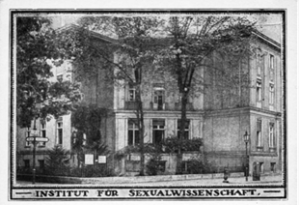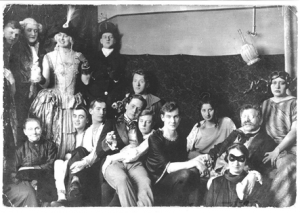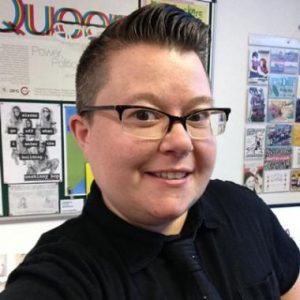The fourth workshop of the ‘Transformations’ series explored ideas about different spaces and settings, the lines between private and public, and medical and community spaces in the past and the present.
In this workshop the participants were able to “visit” the Institute of Sexology in Berlin, which was opened by German sexologist Magnus Hirschfeld 100 years ago, in 1919. The institute was dedicated to researching sex, gender and sexuality from a range of different perspectives. As we explored in earlier workshops, Hirschfeld was an authority on homosexuality; he also came up with new labels and ways of understanding trans identities and treated trans people as patients in the institute. He was deeply invested in understanding, supporting, and campaigning on behalf of LGBTQ+ people.

The Berlin Institute for Sexology (1919-1933)
The Berlin institute is therefore one space where we find evidence of trans people (and other gender and sexually diverse people) in the past, and it is an example of how lines between medical and non-medical spaces, clinical and community spaces, have sometimes been blurred within LGBTQ+ histories. The institute was a place of research, activism and employment, and also a social space for those in the LGBTQ+ community. 
It is hard to piece together what was in the institute because a lot of it was destroyed by the Nazis in 1933; a dramatic and emotionally moving history that we explored in relation to other ways in which trans and queer history is often obscured. What is lost matters, and the absences in the archive are just as important as what is kept and what survives. With all this in mind, the Transformations project “recreated” the Institute of Sexology, mapping out the plan of the institute on the floor of the workshop space, with the academics acting as tour guides – taking the young people through the different rooms which existed within the institute.

Karl Giese, Hirschfeld’s partner, giving a tour of the Institute’s collections
There was the clinic, where the institute staff studied people and particular case studies, the lecture theatre and advice room, where the staff saw people seeking advice, including heterosexual couples, the museum, archive, and library, housing the Institute’s massive collection of objects and materials relating to sex from across time and around the world, the domestic space, and finally the social space, after which we imagined we were being taken to “Eldorado”, a queer club in Berlin, where Hirschfeld took a young Harry Benjamin.

A costume ball at the Institute

We looked at the way in which the institute combined medical, public, private, domestic, and social spaces. We discussed the tensions and complexities associated with the fact that although Hirschfeld is a well–loved historical figure the for LGBTQ+ community – because he was a pioneer and should be celebrated for his activism – he also used his LGBTQ+ patients to collect evidence to further his own expertise and authority.
Later in the workshop, we discussed designing our own institutes and considered what we would prioritise, and how what we would do would be similar to or different from Hirschfeld’s vision. We discussed this in the context of ongoing conversations about what makes spaces safe or comfortable. When we discussed the Eldorado Club, its historical significance soon became intertwined with modern scenarios, for example, the issue of cis heterosexual people who enter queer and trans spaces. In 1920s Berlin, cis heterosexual tourists wanted a glimpse of LGBTQ+ life and were taken on tours around the institute and went to clubs like the Eldorado; similarly today, hen parties and other large groups of non–LGBTQ+ people ‘invade’ queer bars.

Our fantastic guest speaker Dr Francis Ray White gave a fascinating talk on the history of segregated toilets. They explored how, for at least the last 150 years, public toilets have acted as a locus for cultural anxieties over gender, class, race, sexuality, age and ability. Often surfacing as debates about privacy, safety or social contagion, these moments reflect white, hetero -patriarchal society’s attempts to police public space and resist progressive social change. This then led to a discussion of how contemporary transphobia fits into this history, and what it means for trans people to constantly be expected to talk about toilets in particular.

Dr Francis White
At the end of the workshop we took stock and reflected upon the whole ‘Transformations’ workshop series and looked back through our workbooks. We explored the ways in which these captured our different journeys throughout the workshops and reflected upon the use of creative and discursive methods, and our engagement with the key materials, figures, and ideas. Reflecting on all of our individual experiences and learning, the group discussed what everyone would want others (friends, family or the general public) to know about trans, non-binary and queer histories, and the history of medical and scientific attempts to understand gender diverse people.
The amazing discussions and work produced in these workshops are feeding into and inspiring the next stages of the ‘Transformations’ project – creating a brand new theatre performance and showcase that will tour the UK in 2020! 
